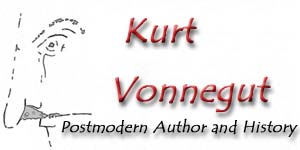Why I chose them
I chose SF and BC as the focus of my thesis in discussing
authorial strategies because these two novels have several common features.
Definitely, these two novels are different in their subject matter: one
focuses on the experience of the Second World War, while the other mainly
presents fragments of American culture. One provides the fantasy of the
outer planet Tralfamadore, while the other tells the meeting of two Americans
on earth. One presents Kilgore Trout as a failed science fiction writer
without ''doodly-squat;'' the other announces him as a winner of
Nobel Prize for medicine at the end. Obviously, SF has become the
most renowned work of fiction in Vonnegut's writing career. It is often
regarded as Vonnegut's climax, as Tony Tanner describes the novel as ''the
masterly'' (3). Even Vonnegut himself grades the book with an A+.
On the contrary, BC seems to receive a completely opposite review
by some critics, such as Prescott, who uses ''hate'' (40) to describe
his discontent on the book. Vonnegut gives the self-comments on both books
in an interview: ''Slaughterhouse-Five and Breakfast of Champions
used to be one book. But they just separated completely. It was like a
pousse-cafe, like oil and water¡Xthey simply were not mixable. So
I was able to decant Slaughterhouse-Five and what was left was Breakfast
of Champions'' (qtd. in Allen 108). It seems that the production
of
BC suggests the fact that Vonnegut is ''crossing the spine of
a roof¡Xhaving ascended one slope'' (4) since he has created
what the critics called a masterpiece of his writing career.
What I have found, however, is that the two works share some characteristics
which serve as excellent examples for the discussions of the authorial
control. The close publishing time of SF (1969) and BC (1973)
is not the only reason I chose them for detailed discussions on the problems
of the authorial power in this thesis. More importantly, as I focus my
discussions on the power or powerlessness of the author, Kilgore Trout,
who is usually seen as an alter-ego of Vonnegut by the critics, will be
the most conspicuous character to start with in my discussion. It is without
coincidence that Kilgore Trout does appear in both novels as a mindless
and unprofessional science fictional writer and his stories have been summarized
and become parts of the two novels. Moreover, in both novels, Vonnegut
merges the position of the biographical Vonnegut persona with the omniscient
narrator, which the realistic and modernistic narratives do not allow.
For the most prominent strategic features, both novels adopt elements of
metafictional writing and the inherent spirit of black humor as I have
pointed out previously. My thesis, therefore, chooses these two novels
to analyze how Vonnegut's writing strategies have changed the traditional
authorial power and allowed new kinds of power to the author in the postmodern
time.
Wanna Read More?
This thesis, therefore, will be a textual study in order to examine
the authorial power and powerlessness of the two novels of Vonnegut. In
chapter one, I will offer a definition of what I mean to be the power of
the author in realist and modernist traditions as the ground for the discussion
on the loss of the authorial power in the two chosen novels of Vonnegut.
In the following two chapters, I will discuss respectively why Vonnegut
chooses to abandon the authorial power and what power he has gained through
the very renunciation in SF and BC. In these two chapters,
I want to argue that though Vonnegut's fictional treatments of the authorial
control appear to be negative and destructive, it is by this very means
that the author can produce a fictional work which connects form with the
subjects of nihilism and lack of free will and brings power again to the
author.
To conclude, this thesis wants to argue that the author has to abandon
the traditional authorial power in order to acquire his power as a metafictional
writer. The metafictional authorial power is quite paradoxical because
the author has to be powerless first as he abandons certain traditional
authorial control over text. However, the renunciation of the authorial
control is for the successful presentation of the author's thematic concerns
because the realistic and modernistic authorial mode is hardly adequate.
Therefore, through the presentation of the author as a powerful/less one,
Vonnegut is able to bring forth his message to readers in the face of chaotic
and disastrous human experiences.
|

